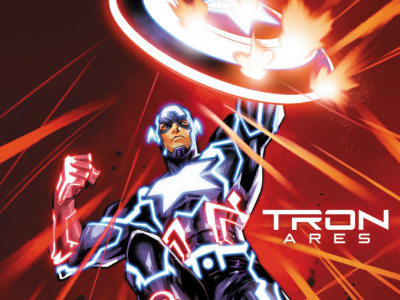One of the three segments on Sixty Minutes II on Wednesday was titled 'The Superheroes,' and dealt with the current resurgence in the comics business. The movies were the largest area of focus, with Spider-Man the anchor property. Stan Lee, Avi Arad, and Joe Quesada of Marvel all spent significant time on camera, with Lee describing the creation of Spider-Man (no mention of Steve Ditko), Arad talking about the movies he's producing featuring Marvel characters, and Quesada talking about the creation of comics at Marvel now.
Calling Arad 'arguably the hottest movie producer in Hollywood,' anchor Bob Simon set him up with his question, 'Are comics the hottest thing in Hollywood?'
Arad was ready with a Hollywood answer. 'It's very simple,' he said. 'They make money; that's what makes them hot.' Arad was shown on the set of Daredevil and listening to a script pitch for Namor, and a small subset of the numerous other Marvel movies in the pipe were mentioned.
Stan Lee took Simon into Golden Apple Comics in Los Angeles to view his oeuvre and performed his usual admirable job as ambassador for the industry, spinning the stories of the creation of Spider-Man, Mario Puzo's failed attempt to write a comic, and other anecdotes. The only Sixty Minutes-style moments came when Simon focused on the question of whether Lee was getting any money from the Hollywood success of the characters (no). Simon asked, 'Do you feel that you're being screwed?'
Lee answered, 'I don't want to say that. I'm still part of the company; I love the people; I love the company. I try not to think about it.'
Simon also asked Arad whether he thought Lee was getting a fair shake. Arad's response was that the Spider-Man property involved 'years of work by many, many people.' 'There's no one person that's responsible for all of it,' he said.
Admirably, the segment also went beyond superheroes, with interviews with Art Spiegelman and Chris Ware (including prominent mention of their literary awards), discussion of the graphic novel as serious comics for adults, and a reference to the graphic novel as the source material for Road to Perdition. Spiegleman's Maus was described as having changed comics 'almost as much as Spider-Man did.'
Simon asked Spiegleman, 'Is the comic book world at a tipping point?'
Spiegelman's response was a great moment. 'Something is really afoot,' he said. 'I couldn't have even said that even six months ago. Where Maus, for instance, was seen as an anomaly, now Maus is seen as part of a larger picture.'







